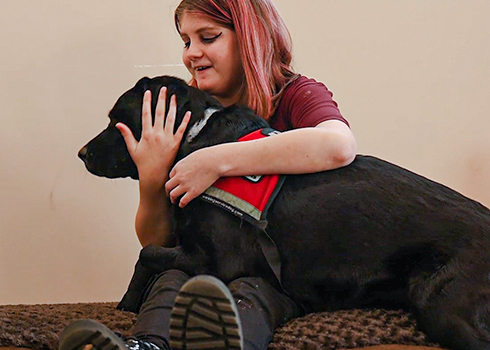How to Support our Organization
1. Become a Puppy Raiser
The service dog training program is 12-18 months. Our puppy raisers take furry students to and from weekly obedience classes and check-in training sessions. In addition to providing a loving home, puppy raisers partake in daily at-home training to reinforce what was learned in class. Note, not all dogs make it through the program and continue on to become therapy dogs. The foundations we require our puppy raisers to set are:
-
 Basics
Basics
Potty training, manners, puppy class completion
-
 Socialize
Socialize
Getting the dog out and about, experiencing a lot of different situations
-
 Canine Good Citizen
Canine Good Citizen
Course completion
-
 Care
Care
Maintainance of health and welfare of the dog
2. Contribute Financially
We provide service dogs to children with autism at no cost, which means our organization heavily relies on donations from fellow Wisconsinites. From dog food to travel and training expenses, it takes a vast amount of resources to continue our mission. Monetary donations go towards food, treats, vet bills, training tools and dog trainers.
Note: As a 501(c)(3) charitable organization, any form of donation you make to our non-profit is tax-deductible.
3. Donate Dog Food & Supplies
Our pups are learning new skills and training hard. Treats and toys are absolutely necessary! Dog supplies like food, treats, leashes, collars, toys and beds are provided for up to 10 dogs at a time - which becomes expensive! We appreciate and rely on supply donations to keep our non-profit successful.
4. Attend our Events
DogsInVests holds events and the proceeds benefit our non-profit! Past events include Pups & Pumpkins Dinner and Pancakes for Pups! Our last event raised $15,000 for DogsInVests. Check out our newsletter for upcoming events!



How Service Dogs Assist Children with Autism
- Emotional Support: Service dogs provide unconditional love and companionship to children with autism, which reduces stress, anxiety and other emotions.
- Social Skills Development: Service dogs help children with autism develop social skills by encouraging them to communicate and interact with others. For example, a child may feel more comfortable approaching other children while accompanied by a service dog.
- Sensory Processing: Children with autism have difficulty processing sensory information, which sometimes leads to sensory overload or shutdowns. Service dogs provide deep pressure therapy, which can be calming for children with autism.
- Safety: Service dogs provide safety by preventing children from wandering off or getting into dangerous situations. They can also alert caregivers if a child is in distress.
We serve the communities of Milwaukee, Waukesha, Mukwonago, Madison and surrounding areas from our Palmyra headquarters.





